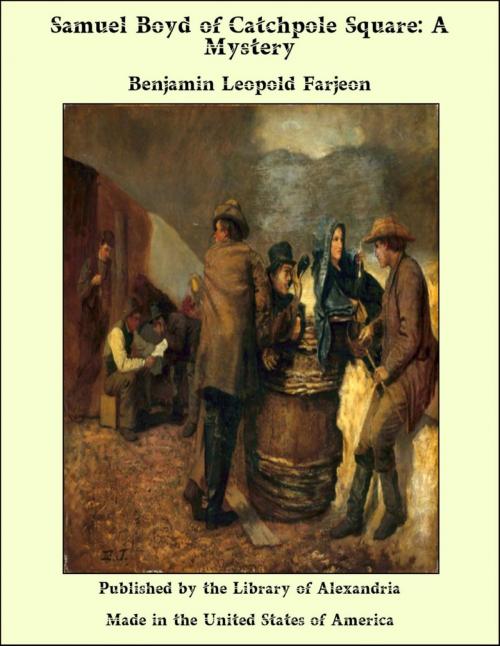Samuel Boyd of Catchpole Square: A Mystery
Nonfiction, Religion & Spirituality, New Age, History, Fiction & Literature| Author: | Benjamin Leopold Farjeon | ISBN: | 9781465593573 |
| Publisher: | Library of Alexandria | Publication: | March 8, 2015 |
| Imprint: | Language: | English |
| Author: | Benjamin Leopold Farjeon |
| ISBN: | 9781465593573 |
| Publisher: | Library of Alexandria |
| Publication: | March 8, 2015 |
| Imprint: | |
| Language: | English |
At six o'clock in the evening of the first day of March, in the year of Grace, 1898, Abel Death, a man of middle age, with a face appropriate to his name--which should never be given to any living human being--was sitting at his desk, employed in the task of writing the last of a number of letters, in accordance with the instructions of his employer, Mr. Samuel Boyd, of No. 6, Catchpole Square, in the North district of London. The letters all referred to Money: to Money due for principal and interest, and to warnings and threats of what would be done in case prompt payment was not made at such and such an hour on such and such a day. Uncompromising and relentless to the point of cruelty, debtors were told in plain terms that ruin was their portion if Mr. Boyd's demands were not complied with. Abel Death appeared to be just the kind of man for the task he was executing, being hollow cheeked and sunken eyed; his hands were long and lean, his movements eager and restless. Clad in shabby and badly fitting clothes, he did not belie the position he occupied, that of an ill paid drudge working long hours for a hard taskmaster. The room in which he sat, and in which his daily duties were performed, could scarcely be called an office. From the number of singular articles it contained it might have been a curiosity shop, or the store-room of a dealer in the miscellaneous goods of the earth to whose net everything that presented itself was more or less marketable fish. Here was a massive safe fast bedded in the wall and securely locked; here a grand piano, locked; here weapons and armour of all nations, and pictures in which lay dumb stories of fruitless genius and disappointed ambition; here pieces of valuable china and bric-à-brac; here some dozens of wine of a rare vintage; here hangings of old tapestry; here (the oddest feature in the heterogeneous collection) a waxwork figure, holding in its outstretched hand a cane stick of the reign of Charles the Second; and, scattered in all directions, but still with some kind of method in the order of their disposal, a great variety of other oddments: all taken for debt, and all representing, in different degrees, despairing hopes and reckless extravagance and prodigality which had come to a bad end.
At six o'clock in the evening of the first day of March, in the year of Grace, 1898, Abel Death, a man of middle age, with a face appropriate to his name--which should never be given to any living human being--was sitting at his desk, employed in the task of writing the last of a number of letters, in accordance with the instructions of his employer, Mr. Samuel Boyd, of No. 6, Catchpole Square, in the North district of London. The letters all referred to Money: to Money due for principal and interest, and to warnings and threats of what would be done in case prompt payment was not made at such and such an hour on such and such a day. Uncompromising and relentless to the point of cruelty, debtors were told in plain terms that ruin was their portion if Mr. Boyd's demands were not complied with. Abel Death appeared to be just the kind of man for the task he was executing, being hollow cheeked and sunken eyed; his hands were long and lean, his movements eager and restless. Clad in shabby and badly fitting clothes, he did not belie the position he occupied, that of an ill paid drudge working long hours for a hard taskmaster. The room in which he sat, and in which his daily duties were performed, could scarcely be called an office. From the number of singular articles it contained it might have been a curiosity shop, or the store-room of a dealer in the miscellaneous goods of the earth to whose net everything that presented itself was more or less marketable fish. Here was a massive safe fast bedded in the wall and securely locked; here a grand piano, locked; here weapons and armour of all nations, and pictures in which lay dumb stories of fruitless genius and disappointed ambition; here pieces of valuable china and bric-à-brac; here some dozens of wine of a rare vintage; here hangings of old tapestry; here (the oddest feature in the heterogeneous collection) a waxwork figure, holding in its outstretched hand a cane stick of the reign of Charles the Second; and, scattered in all directions, but still with some kind of method in the order of their disposal, a great variety of other oddments: all taken for debt, and all representing, in different degrees, despairing hopes and reckless extravagance and prodigality which had come to a bad end.















